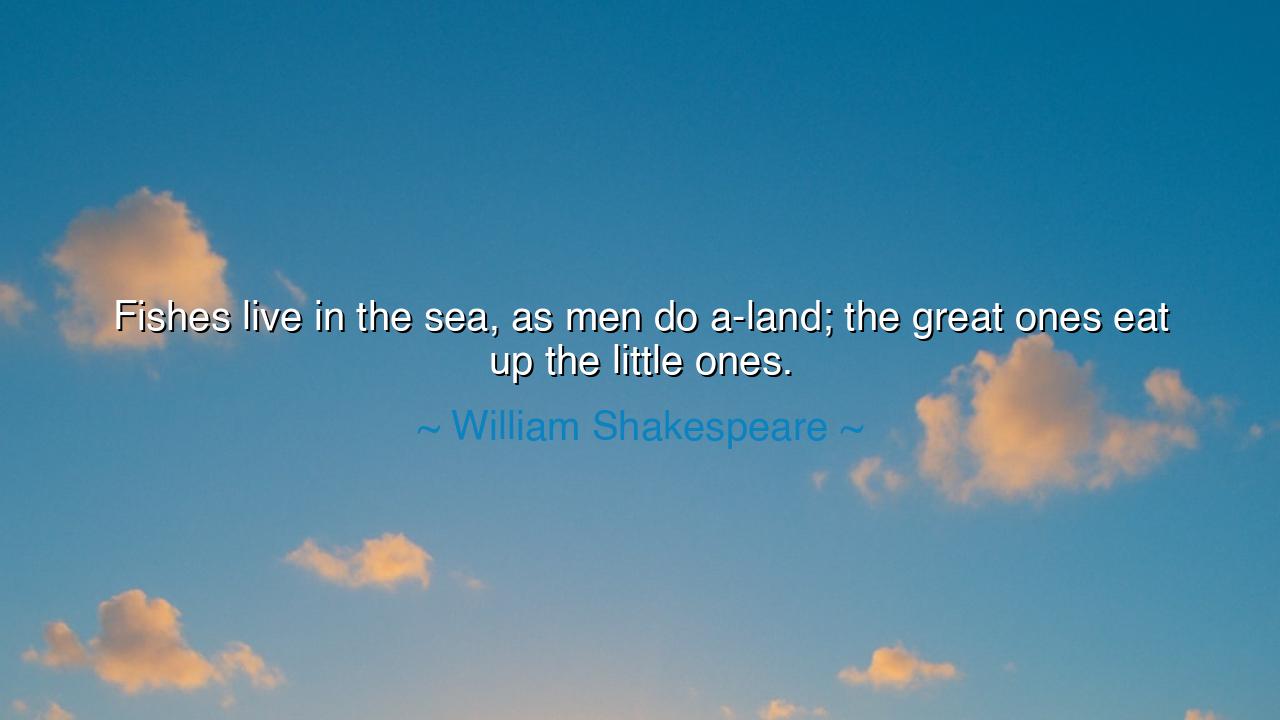
Fishes live in the sea, as men do a-land; the great ones eat up






In the words of William Shakespeare, the great bard of human truth, we hear: “Fishes live in the sea, as men do a-land; the great ones eat up the little ones.” At first glance, this seems but a simple observation of nature—a truth that even a child might see in a pond. Yet within it lies a reflection of the human condition as deep and vast as the ocean itself. For Shakespeare, with his vision that pierced the hearts of men, saw the world as a sea in which we all swim—some mighty and swift, others small and struggling—and in that sea, the strong devour the weak, not always with teeth, but with power, greed, and cunning. This saying is not only a mirror of society, but a cry of wisdom against injustice, a call for awareness of the currents that shape our lives.
The origin of this quote comes from Pericles, Prince of Tyre, one of Shakespeare’s later plays. It is spoken by a fisherman, a humble man of the sea, as he reflects upon the way of the world. In his simple speech, the fisherman sees that what happens beneath the waves also happens among men: the powerful consume the powerless. Thus Shakespeare, through this rustic voice, lays bare the eternal truth that human society mirrors the laws of nature—but without its innocence. The fish that devours another does so to live; the man who devours another often does so out of greed. And therein lies the tragedy and the warning of the line: that our civilization, for all its splendor, still swims in the ancient waters of domination.
Consider, then, the sea. In its depths, the small dart from shadow to shadow, while the great swim leisurely above, careless of the destruction they bring. So, too, on land do kings, merchants, and rulers move among the multitudes, their ambitions vast as tides, their appetites unending. In every age, the same pattern unfolds: those with wealth or power often consume the labor, the time, and the hope of those beneath them. Yet unlike the beasts of the ocean, we possess reason and conscience—two gifts meant to restrain our hunger. When these are cast aside, men become as savage as sharks in blood-dark waters.
There is a story from the days of the industrial age that illustrates this truth. In the heart of London, a man named Robert Owen managed vast textile mills where children toiled from dawn to dusk. He saw with sorrow how the “great ones ate the little ones”—how the rich grew fat upon the labor of the poor. But Owen, unlike most men of his rank, chose another path. He reduced working hours, improved conditions, and offered education to those who had been voiceless. Many mocked him, saying he would ruin his fortune. Yet what he proved was greater: that power need not always consume—it can protect, uplift, and redeem. Thus he became not another predator of men, but a guardian of their dignity.
Shakespeare’s words, then, are not merely a lament but a mirror held to the conscience of humanity. He reminds us that the struggle between the great and the small is not only natural, but moral. Each man must choose whether he will swim with the sharks or shelter the small fish beneath his fin. The sea of life cannot be escaped—but its nature can be transformed. Compassion, justice, and mercy are the currents that can change its flow. Those who rise to power and yet remember humility become beacons in the dark waters, guiding others toward safer shores.
And yet, let us not see ourselves only as victims. For even the small fish can find wisdom, courage, and unity. A single fish may be eaten; a thousand swimming together can shape the sea itself. The weak, when joined in purpose, can challenge the strong—not with violence, but with vision, integrity, and faith. History is filled with those who refused to be consumed: from the slaves who sought freedom, to the workers who demanded fair treatment, to the voices who rose against tyranny. They proved that while the sea is vast, the soul of man is vaster still.
The lesson, then, is this: the world will always contain the great and the small, but it is the heart that decides whether greatness becomes tyranny or guardianship. If you rise, lift others with you. If you have power, wield it as a protector, not a predator. If you are small, take heart—your dignity, courage, and unity are greater than any crown. The sea devours only those who forget to swim with wisdom.
So remember, dear listener: though “the great ones eat up the little ones,” you are not destined to be prey or predator. You are called to be human—to temper strength with mercy, ambition with compassion, and survival with love. For when man learns this balance, the sea of life will no longer be a place of fear, but a vast and living harmony, where even the smallest may thrive beneath the sun.






AAdministratorAdministrator
Welcome, honored guests. Please leave a comment, we will respond soon